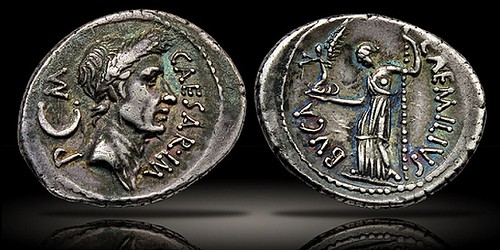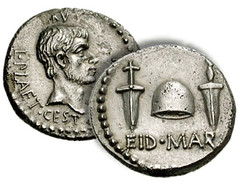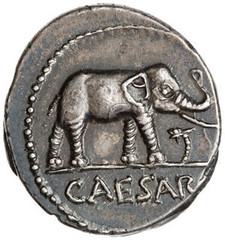
PREV ARTICLE
NEXT ARTICLE
FULL ISSUE
PREV FULL ISSUE
COINS OF JULIUS CAESAR
The September 19, 2016 article in Mike Markowitz'CoinWeek Ancient Coin Series discusses the coins of Julius Caesar. Here's
an excerpt. Be sure to read the complete article online. -Editor

What Makes Caesar so Great?
There cannot be many collectors of ancient Roman coins who have not coveted owning at least one coin of Julius Caesar. Surprisingly, this is a goal within the reach of relatively modest budgets, as well as a challenge for even the most affluent.
Elephant Denarius
Romans loved conquest, and Caesar became immensely popular. When the Senate demanded that he disband his victorious army, on 10 January 49 BCE Caesar “crossed the Rubicon” (a small stream that formed the boundary between Italy and Cisalpine Gaul), initiating a civil war. To pay his legions (and settle his enormous debts) Caesar seized the Roman treasury’s stockpiled silver and issued an estimated 22.5 million denarii bearing his own name. The symbolism of these “elephant” coins–as well as which side is actually the obverse–has long been debated (Nousek, 2008). On one side, an African elephant tramples a dragon. The “dragon” is probably a carnyx, a large bronze war trumpet used by Gallic tribes. The other side of the coin shows a ladle (cullulus), a holy water sprinkler (aspergillum), a sacrificial axe adorned with a wolf’s head (securis) and an apex (a peculiar hat with a top spike and ear flaps). These ritual implements were emblems of the Pontifex Maximus, the high priest of the Roman state religion. Caesar had been elected to this prestigious office in 63 BCE. To read the complete article, see:
THE BOOK BAZARREWayne Homren, Editor The Numismatic Bibliomania Society is a non-profit organization promoting numismatic literature. See our web site at coinbooks.org. To submit items for publication in The E-Sylum, write to the Editor at this address: whomren@gmail.com To subscribe go to: https://my.binhost.com/lists/listinfo/esylum All Rights Reserved. NBS Home Page Contact the NBS webmaster 
|

